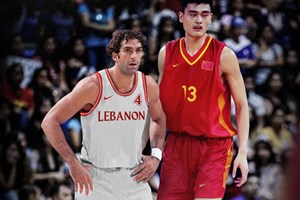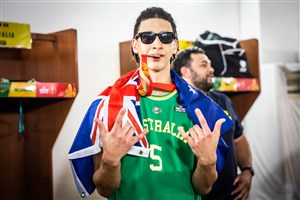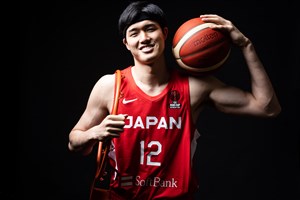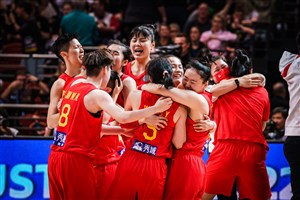
Samad Nikkah Barahmi: FIBA Asia Cup 2007 was the turning point for Iran basketball
TEHRAN (Iran) - Samad Nikkah Bahrami was chilling around in the northern parts of Iran as he talked with FIBA Asia Cup on Instagram. With nearly two decades of experience on hand, Bahrami talked in detail about the national team before and during the rise to become a powerhouse in Asia as well as the future ahead.
Make sure to check out the entire discussion on FIBA Asia Cup's IGTV.
View this post on Instagram
Before becoming the among the top ranked teams in the Asia/Oceania region, Samad recalled of his younger days where he and his friends could barely even dream of Iranian basketball being where it is today. Basketball was not yet a big time sport in the country at that time, but Samad believed in its potential.
"I can remember, at that time, basketball was not professional in Iran. Players weren't getting paid a lot and most of the players had another job on the side," said Samad.
"I was like maybe 15-17 years old when Iranian basketball was nowhere in Asia, even in West Asia."
"I was really suffering when I saw everyone talking about every other sport on TV and not basketball, but I really believed in us," he said. "I was thinking that Iranian basketball players had good size, great intelligence, and we love basketball. So I was just thinking if they cared a little bit more about basketball and us, we could do something."
Samad recalled dreaming and talking with his good friend as a teenager about one day becoming a professional player, about playing overseas, having a driver, having a lot of money, being famous, and being recognized.
It was all a dream back then. Then, it all started to change.
Not only were the players of Samad's generation focused on practicing harder than ever, the players of the previous generation that had transitioned to being coaches shared the same mentality. They increased the number of practices sessions from the usual 3-4 days a week to twice-a-days.
As a matter of fact, Samad worked so hard that it almost become a problem for him as a younger player in the national team pool.
"I was very young when I got to the national team, 17-18 years old," he explained. "I never wanted to be a young player on the team, I just wanted to be a key player in the team. Maybe now people think that I was young and they pushed me because I was young, but I remember I was practicing maybe two more times any other player in Iran for every day, not for a month or two months or for a short period of time. I just wanted to out-practice everybody because I just wanted everybody to respect me because of my game. Not my age. Not because I was young. Not because I was tall. Not because I was strong. I just wanted to make a change every time I got to the game."
"The hard thing was to make that personality for myself to just prove to everybody they can count on me, that I can change the game. Prove that if I'm on the court and off the court, what are the differences."
"I remember I get to the camp, physically I was not that strong. Some older players, they didn't want to give up their places which is normal. They were tough on me, bodied me, pushed me, bumped me so hard. So I remember, me and brother, we went to the weight room like four hours a day and I was young so my body was ready for that, too. I gained like 16-17 kilograms, ridiculous muscles."
"Then, I went to the camp next summer and I was bumping everybody, pushing everybody. Then I remember the coach telling me out of practice 'You are young, you cannot hit everybody like that' but I didn't want to hit everybody! I was just big and I wasn't used to my body and I was very strong all the sudden. That was hard and tough. I didn't want to disrespect anybody but I was young and gained a lot of weight and muscles and I was very strong."
All of the pieces finally fell into place at in 2007. Heading into the Asia Cup in Tokushima with little to no expectations, Samad and Iran ended up changing the course of history by winning their first of many titles.
"[Before the tournament] we had some young players and we had experienced players. All of the sudden, all of the experienced players were injured one by one and they leaft the camp. A week before the tournament, the team left for the Asia Cup and I remember everybody - newspapers, everyone - saying that this team will never go to the second round."
It was a fair assumption in the moment. Iran were grouped with Jordan, the Philippines, and the defending champions China.
"Everyone was saying that [we] aren't going to make it, we aren't going to be good because we were young, we didn't have any good experience."
"Inside the [training] camp, we all believedin ourselves because we had very good practices," he said. "Rajko Toroman is a very good coach. He changed the mentality of the other player to think that we can do it. It didn't matter if we were young, if we were inexperienced, whatever. We had a good team and we practiced really hard and good for him, so we ran into the tournament and we beat everybody."
Making their way through to the Final against Lebanon was further than what anyone on the team imagined. They were confident of how good they were, but this stage was already the furthest any Iran national team had gone in the Asia Cup. They were a young team that wasn't quite sure what was up ahead for them in the future, yet here they were.
"I had no idea what was the 'Olympics'. I wanted to go to the Olympics, that would be nice. But we couldn't even touch or feel what was going to happen to us. I remember [the president of the federation] wrote on the board that if we win, we will get the ticket to the Olympics and our professional lives will be changed."
"So we go to the game and, obviously, we beat Lebanon. Then we qualified and we were happy, jumping up and down all over the court, yelling and singing, whatever. Then we come back to the locker room. I remember that I read it again, it's the same thing that he wrote on the board. I remember thinking 'okay, we are going to the Olympics. So what is this?'"
"Then the next year, I was walking in the opening ceremony parade at the Olympics and I was thinking 'okay, he was right. He was seeing ahead'."
"I had no idea what it was at that time and I can say that the benchmark for Iranian basketball was that championship because after that, every team in Asia respected us. We believe in ourselves and then everybody in Iran believed in us."
"He was right, everything changed."
Because of that and many other reasons, the Asia Cup 2007 title will always hold a special place in Samad's heart.

"That was our first title," Samad said of his all-time favorite Asia Cup experience. "I think that was the turning point for Iranian basketball and Aidin - my brother - was there with me so that was the best one for me. Maybe I can't remember any of those games, but I remember so many situations and I have so many images of 2007 in my head."
That title gave the opportunity for Samad and the national team to play all over the world whether it was in the NBA Summer League, Europe, or Australia. They got to beat Serbia. Samad got to experience a star-caliber NBA talent firsthanded going up against Manu Ginobili. And all of that experience rolled along into the preparation for Asia Cup 2009.
They say defending a title is tougher than winning the first one, but Samad disagrees.
"I have to say the second time [in 2009] was so easy. I'm telling you, we had confidence through the roof," Samad claimed.
"When we won in 2007, everybody was talking about how China didn't go with the full team and that's why you guys won the championship. That was the only thing that bothered us for those two years. So when we faced China in the Finals, we beat them [18] points."
"I remember all the fans leaving the the stadium because we were dominating. The thing is that crazy confidence we had coming back from the Olympics with the experience as a young national team, so that the easiest one."

Iran were able to settle their slight "grudge" with China in 2009, but he still longed for more opportunities to go against a full force China squad. Samad got those chances early on against Yao's China teams in the early 2000s and wishes the two national teams could have had the chance to go up against each other in their primes.
"I think it was almost impossible to beat China at that time but I cannot say that. We were not in our peak, we were young."
"That would be a very nice matchup, if we could play against them when we were our prime. I think we could play against them because Hamed would match up against Yao and I think we could do something."
"I really miss playing against China with their best prime time generation."
Samad also has much love for Lebanon's Fadi El Khatib as well, who he mentions to have had a friendly competitive rivalry with since forever.
"Fadi had a name [for himself] before me and they were [always] talking about how he's the best player in Asia. [When I was younger] I didn't have any name and nobody knew me and I just wanted to be somebody. I knew that if I wanted to be somebody, I'd have to play at Fadi's level or maybe even better than him."
"For so many years, me and him, we were chasing each other."
"I know that he respects me a lot and I respect him a lot, too. I remember he was very scary because when I became a national team player, he was the best player in Lebanon and Lebanon was one of the best teams in Asia. They were going to the Finals every time and he was competing. In 2003, they went to the Final against China and he was really playing hard."
"I was in the fan area and I was watching him, I saw how competitive he was and how hard he was going against everybody so I just wanted to be better than him. I was practicing really hard. I remember every time when I came to the national team, I wasn't really competing with any player in Iran. I was really imagining him against me because was thinking that I have to practice hard with the national team since I'm going to have to face him at some point in the tournament."
"I think I have some good memories against him and you have to ask him about that, too!"
It's no surprise that Fadi was named to Samad's All-Time Asia Cup Starting Five alongside four other worthy legends.
"It's really hard. Only 5 players?"
Samad obviously listed his good friend Hamed Haddadi at the center position. He then Fadi at the three, Gabe Norwood at the two, and was a bit more emotional about selecting Mahdi Kamrani at the one.
"I have to mention his name a lot because with his size and what he has done for Iran basketball is really something different. I remember playing with him and he makes the game so easy for me. I have to say so many achievements that I have is because of him because he knows exactly when to pass the ball to me."
"I don't remember any time that the coach told Madhi to call the offense to do this or that. They just give the team to him and he knows how to lead the team. When to change the pace of the team, when to make the game fast, when to make the last shot, whatever. He was really a leader, so Madhi at one."
Samad took some time select the player at the four, but eventually ended up choosing Jordan's Zaid Abbas.
"In 2011, when Jordan upset Iran, it was Sam Daghlas - who is a very good point guard - and Z. Those two guys beat us and they really surprised us. I have to say that Jordan national team without those two guys is a different team."
"I respect so many other players too, but these guys are my favorites."
The Iranian legend who played in seven Asia Cups also talked about the the future of Iran basketball, specifically about Behnam Yakhchali who will be playing in Europe in the upcoming season. He emphasized about the difficulties of playing in Europe as an Asian - as he had done himself in the past - but that he was confident Behnam would be able to succeed and pave the way for many more.
Samad properly wrapped up the talk with a heartfelt appreciation note to the fans for their support over the years.
"Without the fans, I wouldn't Samad Nikkah Bahrami like you know me now. Like they know me in the streets every time, they say hi, they want to take a picture, they want a signature, but they give a lot of energy, too. They think for them it's something special to see me and then take a picture with me, but they don't understand how much energy they give to me to sustain and stay at this top level to make them proud."
"I have to say that most of the things that I have right now - actually everything that I have right now is because of them. Because they push me, they pray for me, they love me. The energy they give and send to me when I was playing with the national team all around the world is something huge that changed my life, too. I'm not going to trade anything for that."
Make sure to check in to the full discussion on @FIBAAsiaCup IGTV including tidbits on the backstory of Samad's jersey number, his expectations for Arsalan Kazemi, and his relationship with Hamed Haddadi!
FIBA
















